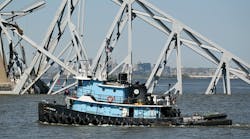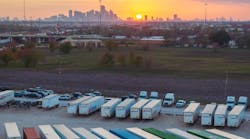Highways — and the trucks that use them — don't seem to get much respect anymore. On top of that, nobody seems to want to provide funding for highway maintenance and expansion either, despite the critical role highways (and trucks) play in keeping the U.S. economy up and running.
For example, take a look at a 176-city survey recently published by the U.S. Conference of Mayors and compiled with help from national polling firm Parsons Brinckerhoff. The vast majority of mayors in some of the biggest U.S. cities want the federal government to significantly step up investments in all sorts of transportation infrastructure — railroads, airports, even bike lanes and pedestrian paths — except for roads.
While 93% of mayors support reform in federal transportation programs to increase direct funding to cities and metropolitan areas, only 7% support an increase in the federal gas tax if that money is not given directly to cities and metropolitan areas. But 75% of the mayors indicate support to increase the federal gas tax if a greater share of the funding is invested in bicycle and pedestrian projects, while 80% of the mayors indicate that highway expansion should be a “low priority.”
Think about that last stat for a minute: 80% of U.S. mayors think highway expansion should be low priority. Yet these are the very same highways that serve as the channels of commerce for cities.
Trucks hauled 8.8 billion tons of freight in 2009 (the most current data available), which equates to roughly 68% of the tonnage hauled by all modes of freight in this country. And 80% of U.S. mayors think highway funding should be a low priority?
Here's another factoid they should consider. According to just some of the research compiled by the American Association of State Highway and Transportation Officials in the group's “Unlocking Freight” report published in July 2010, an additional 1.8 million trucks will be on the road within a decade, and in 20 years, for every two trucks today, another one will be added. Despite more long-distance freight being moved by intermodal rail, the report finds that trucks will still carry 74% of the load.
On average, 10,500 trucks a day travel certain segments of the Interstate Highway System today. By 2035, this will increase to 22,700 commercial trucks for these portions, with the most heavily used segments seeing upwards of 50,000 trucks a day. Yet between 1980 and 2006, while traffic on the Interstate Highway System increased 150%, Interstate capacity increased only 15%.
Maybe it's just me, but there still seems to be a huge disconnect between the economically vital role trucks and highways play in this country and what perception most people — mayors included — maintain about big rigs and those long ribbons of asphalt and concrete.
Unless that perception is changed, I don't think much of the economic growth mayors are hoping for will materialize at all.
Sean Kilcarr is Fleet Owner' s senior editor. He can be reached at [email protected]


